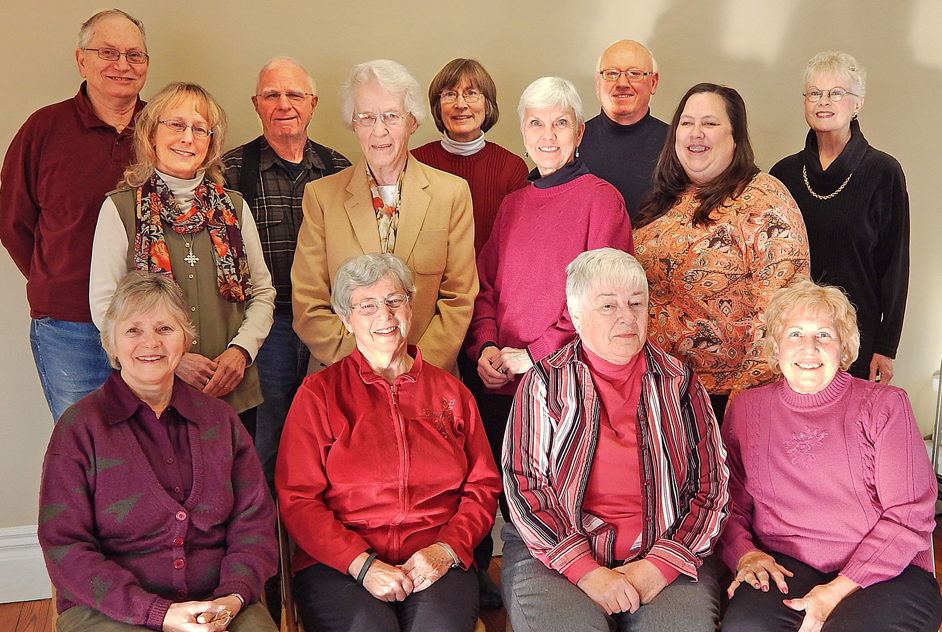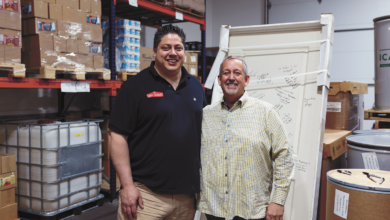Brockport Ecumenical Outreach Committee marks milestone

A fire sparks a quarter century of attention to migrant farm workers’ needs
Most citizens are aware of the clothing center in the basement of Brockport’s St. Luke’s Episcopal Church, first started to serve the migrant farm workers, but now open to all. Many have participated in the spring “Bienvenida” celebration welcoming migrant farm workers with a parade, a dinner, and Mexican dances. Brockport residents may not realize that the clothing center and festival were started in 1990 by the Brockport Ecumenical Outreach Committee (BEOC). BEOC has a long history of many other activities serving the migrant farmworker population.
Founded in February 1989, BEOC celebrates its 25th anniversary this year. The organization began as a result of a fire that brought attention to the living conditions of migrant farm workers in the community. It now consists of seven Brockport churches, three related area organizations, and three at-large members (see side bar).
In 1989, a fire in a Brockport Main Street apartment revealed that 40 migrant farmworkers were living in a one-room apartment with one bathroom. Inquiries into the incident made Brockport area churches aware of the hostility, discrimination, and difficult material conditions in which many farm workers lived. Brockport resident Erna Bowman first invited area churches to come together in concern for the farm workers.
According to Barb Deming, author of An Abridged History of Activities for BEOC, “Eight churches joined with farmworkers, growers, and several agencies that work with migrant farmworkers to ‘encourage a peaceful multicultural community.’ This would be accomplished by increasing mutual understanding, reducing prejudice and addressing food, clothing, housing and education needs of farmworkers, and assisting them to empower themselves.” With that expressed purpose, the eight churches formed the BEOC, and since “has been an organization that has responded to voices in the farmworker community,” the history continues. Deming was president of BEOC from 1996 to 2005, following Bowman who was the first president. The BEOC became an affiliate member of the Greater Rochester Community of Churches in 1993.
Interventions
The quarter century of outreach is characterized in part by awareness of farmworker needs and collaboration among responders in a long history of interventions (see side bar).
Advocacy
Another aspect of BEOC outreach is advocacy for farmworkers and for consumer purchase of local produce. Farmworker Advocacy Day started in 1995 and continues today, helping farmworkers empower themselves through state-wide networking and lobbying for legislative changes. In early 2000 BEOC worked with local grocers to promote locally grown produce, advocating for the farmworkers and growers behind them. The “Bienvenida” festivities began in 1990 to promote appreciation for farmworkers as well as to welcome them.
Systemic Action
At the systemic level of BEOC’s work, current BEOC president Bill Plews included this statement in an address to his church’s congregation, St. Luke’s Episcopal Church in October, 2013: “We work to support legislative change that would give migrant farmworkers just treatment and an end to discrimination. At the federal level, we are working for Comprehensive Immigration Reform. We seek legal status for those who are here, with a path to citizenship for those who desire it. For future immigrants, we support a system that fulfills our need for agricultural labor without penalizing those who come to fill those needs. At the State level we seek an end to discrimination against farmworkers. Specifically, they should get overtime pay, a day of rest, and the right of collective bargaining. Much of the work that we do in this area involves supporting the larger efforts of the Rural and Migrant Ministry headed by Richard Witt.”
At this quarter-century milestone, Plews was asked about the rewards he has received in his position as BEOC’s president. “I can’t imagine more rewarding work, given that we are a faith-based organization working on issues related to fair treatment for all and to loving thy neighbor. On top of that, I get to work with a group of people that I respect and care for.”
Interventions
A sampling condensed from original sources
Early BEOC history (from Barb Deming’s An Abridged History of Activities)
•In May 1989, a Migrant Information Night Forum was held at Brockport High School with farmworkers as panelists and an audience including growers, clergy, officials, and other special guests.
•In spring, 1990, Amy Machamer of Hurd Orchards in Holley organized sessions of Survival Spanish for Growers to improve communications with their workers.
•A Clothing Center was started in August, 1990 in the basement of Brockport’s St. Luke’s Episcopal Church and continues to this day.
•An Investigation of a Farmworker Drowning was conducted from June through August, 1991, clearing a police officer of allegations that he pushed the victim. The investigation revealed problems of alleged bias toward farmworkers by police in various law enforcement agencies.
•A Farmworker/Law Enforcement Agency Public Forum was held in December 1991 to discuss accusations of bias and abuse with a panel of three farmworkers and representatives of three police agencies.
•Motor Vehicle Workshops were held in the summer of 1992, 1993, and 1994. The public forum (above) revealed that a major issue related to motor vehicle operations, ownership, insurance, equipment violations, registrations and driver’s licenses.
•A bus Shelter at Migrant Camp was built in 1995 for migrant children who were waiting for the school bus in the dark and inclement weather. A local contractor, the farm owners, and farmworkers collaborated in the planning and building.
Recent assistance to farm workers (From Bill Plew’s address to his church in October 2013)
•A woman needed three nights lodging for herself and her daughters before joining her husband who had found work in Georgia.
•Another woman needed a trip to Albion Family Courts for an order of protection from her American boyfriend who had abused her and her baby.
•A man needed two trips to the Mexican Consulate on Wheels in Geneva to get his passport.
•Another man was sick with West Nile Virus and needed airfare to Mexico to be cared for by his relatives.
•Carl Wheat agreed to help out with transportation, and is now teaching the teenage son of a migrant farmworker family how to drive.


